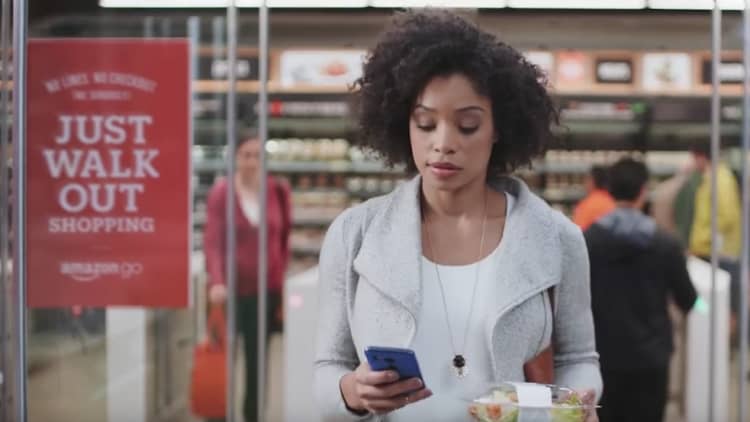
Amazon's proposed $13.7 billion purchase of Whole Foods Market may affect how you buy groceries, even if you don't have an Amazon Prime membership or regularly stock up on heirloom tomatoes from "Whole Paycheck."
"This transaction is going to change the landscape of how you buy food," Mickey Chadha, Moody's vice president and senior credit officer who covers Whole Foods, told CNBC's "Squawk Box" on Monday morning. He expects Amazon to put pressure on grocery stores to lower prices.
For the average American household, grocery costs are the fourth-largest expense after housing, transportation and health care, according to the Bureau of Labor Statistics. The typical household spends roughly 7 percent of its budget on groceries and food spending increases as incomes rise. (See chart below.)
"Most shoppers can expect to see far more aggressive promotions in their favor," said Lindsay Sakraida, director of content at DealNews.com, a comparison shopping website.
Grocery store chains will likely improve their loyalty programs to keep their customers coming back, Sakraida said.
For example, Wal-Mart began offering discounts on about 10,000 items in April if customers bought their products online and then picked them up in the stores. The world's largest retailer will likely expand this "click and collect" program to more groceries and other food retailers, including Whole Foods, will adopt similar tactics, Sakraida said.
You are going to receive more value out of the purchase rather than pushing your cart through the store and wondering if you got a good price.Brent Sheltononline shopping expert at FatWallet.com
Grocery store chains have already mimicked Whole Foods' playbook by offering more fresh produce and organic goods. A potential Amazon acquisition could lead to the "democratization of organic foods," Sakraida said.
Food prices vary greatly based on location. Amazon could improve the grocery shopping experience at Whole Foods and online by making it easier for shoppers to rate and review food items as well as compare prices, said Brent Shelton, online shopping expert at price comparison website FatWallet.com.
"With better price comparison, you are going to receive more value out of the purchase rather than pushing your cart through the store and wondering if you got a good price," Shelton said.
The downside to easier online shopping
For consumers, more convenience could eventually come at a higher cost.
"Retailers have always used door-buster prices to get people in the stores so they can buy more," Sakraida said.
While grocery stores may juice the discounts on some items, they will keep prices steady on others in an attempt to maintain their razor-thin margins. "Don't be blinded by aggressive promotions and pay attention to your overall spending," Sakraida said.
In the future, if a drone carrying your favorite caramel and sea salt gelato is only one click away, how many more pints will you buy?
"Nothing is more impulsive than food and beverage," Shelton said. "Ideally you want to avoid buying groceries out of impulse."





